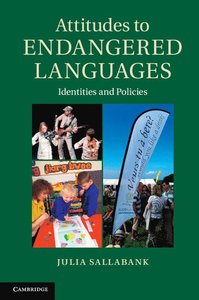
endast ny
Attitudes to Endangered Languages
Language attitudes and ideologies are of key importance in assessing the chances of success of revitalisation efforts for endangered languages. However, few book-length studies relate attitudes to language policies, or address the changing attitudes of non-speakers and the motivations of members of language movements. Through a combination of ethnographic research and quantitative surveys, this book presents an in-depth study of revitalisation efforts for indigenous languages in three small islands round the British Isles. The author identifies and confronts key issues commonly faced by practitioners and researchers working in small language communities with little institutional support. This book explores the complex relationship of ideologies, identity and language-related beliefs and practices, and examines the implications of these factors for language revitalisation measures. Essential reading for researchers interested in language endangerment and revitalisation, sociolinguistics, linguistic anthropology and language policy and planning, as well as language planners and campaigners.
Utgiven: 2013
ISBN: 9781107030619
Förlag: Cambridge University Press
Format: Inbunden
Språk: Engelska
Sidor: 286 st
Language attitudes and ideologies are of key importance in assessing the chances of success of revitalisation efforts for endangered languages. However, few book-length studies relate attitudes to language policies, or address the changing attitudes of non-speakers and the motivations of members of language movements. Through a combination of ethnographic research and quantitative surveys, this book presents an in-depth study of revitalisation efforts for indigenous languages in three small islands round the British Isles. The author identifies and confronts key issues commonly faced by practitioners and researchers working in small language communities with little institutional support. This book explores the complex relationship of ideologies, identity and language-related beliefs and practices, and examines the implications of these factors for language revitalisation measures. Essential reading for researchers interested in language endangerment and revitalisation, sociolinguistics, linguistic anthropology and language policy and planning, as well as language planners and campaigners.
Ny bok
1202 kr1265 kr
5% studentrabatt med Studentapan
Begagnad bok (0 st)
Varje vecka tillkommer tusentals nya säljare. Bevaka boken så får du meddelande när den finns tillgänglig igen.



